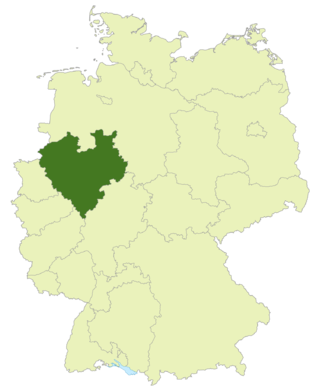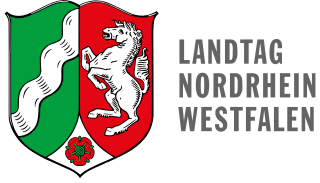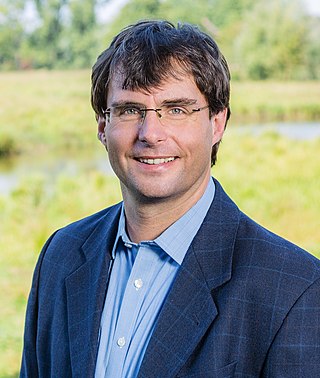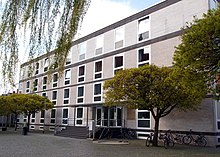
North Rhine-Westphalia or North-Rhine/Westphalia, commonly shortened to NRW, is a state (Land) in Western Germany. With more than 18 million inhabitants, it is the most populous state in Germany. Apart from the city-states, it is also the most densely populated state in Germany. Covering an area of 34,084 km2 (13,160 sq mi), it is the fourth-largest German state by size.

A constitutional court is a high court that deals primarily with constitutional law. Its main authority is to rule on whether laws that are challenged are in fact unconstitutional, i.e. whether they conflict with constitutionally established rules, rights, and freedoms, among other things.

Wolfgang Clement was a German politician and a member of the Social Democratic Party of Germany (SPD). He was the 7th Minister President of North Rhine-Westphalia from 27 May 1998 to 22 October 2002 and Federal Minister of Economics and Labour from 2002 to 2005. He was an Honorary Member of the International Raoul Wallenberg Foundation.

The Oberliga Westfalen is the highest level football league in the region of Westphalia, which is part of the state of North Rhine-Westphalia. The league existed from 1978 to 2008, but was then replaced by the NRW-Liga, a new statewide league. With the reform of the league system in 2012, which reduced the Regionalliga West to clubs from North Rhine-Westphalia only and disbanded the NRW-Liga below it, the Oberliga Westfalen was reintroduced as the highest tier in the region and the fifth level overall in Germany. It is one of fourteen Oberligas in German football, the fifth tier of the German football league system.

The Landtag of North Rhine-Westphalia is the state parliament (Landtag) of the German federal state of North Rhine-Westphalia, which convenes in the state capital of Düsseldorf, in the eastern part of the district of Hafen. The parliament is the central legislative body in the political system of North Rhine-Westphalia. In addition to passing of laws, its most important tasks are the election of the Minister-President of the state and the administration of the government. The current government is a coalition of the CDU and the Greens, supporting the cabinet of Minister-President Hendrik Wüst since June 2022.
The Constitution of North Rhine-Westphalia is the constitutional document that governs the responsibilities and rights of various offices and the Landtag of North Rhine-Westphalia, in Germany.

The Left of North Rhine-Westphalia is the chapter of the Left Party in the German federal state of North Rhine-Westphalia.

Ali Atalan is a Kurdish-German politician of Yazidi faith. He is a former member of the Landtag of North Rhine-Westphalia with Die Linke in Germany, and the Turkish Parliament with the Peoples' Democratic Party (HDP).
Herbert Schnoor was a German politician and lawyer.

Joachim Stamp is a German politician of the Free Democratic Party (FDP) who served as a member of the State Parliament of North Rhine-Westphalia from the 2012 elections to 2022. He served as Deputy Minister President of North Rhine-Westphalia from 2017 to 2022. Since 2023 he has been serving as Special representative of the Federal Government for Migration Agreements.

The Minister-President of North Rhine-Westphalia, also referred to as Premier or Prime Minister, is the head of government of the German state of North Rhine-Westphalia (NRW). The position was created in 1946, when the British administration merged the Prussian province of Westphalia and the northern part of the Prussian province of the Rhine to form the state of North Rhine-Westphalia. In 1947 the state was expanded with including of the state of Lippe.
The 2027 North Rhine-Westphalia state election will be held in 2027 to elect the 19th Landtag of North Rhine-Westphalia.

Yvonne Gebauer is a German politician of the Free Democratic Party (FDP) who served as the State Minister for School and Education of North Rhine-Westphalia from 2017 to 2022. She was active in the local politics of her home city Cologne before being elected to the State Parliament of North Rhine-Westphalia in 2012. She has served on her party's state board since 2016.

The Constitutional Court of the State of Berlin is the state constitutional court of Berlin. It has its seat at the Kammergericht building in the Schöneberg district of Berlin. Since November 2019, Ludgera Selting is the president of the court.

Marcus Optendrenk is a German politician of the Christian Democratic Union (CDU) who has been serving as Minister of Finance of North Rhine-Westphalia since 29 June 2022. He was first elected to the Landtag of North Rhine-Westphalia in 2012.

The Independent Workers' Party (German Socialists) (German: Unabhängige Arbeiter-Partei (Deutsche Sozialisten)), short-form: UAP, was a minor Strasserist political party in Germany. The UAP split from the German Social Union of Otto Strasser in 1962 under the district leader of the Arnsberg section of the DSU, Erhard Kliese. The party can be considered the DSU's successor due to existing until 2014.
Erna Herchenröder-Lohmann was a German trade unionist and politician who served in the Landtag of North Rhine-Westphalia from 1953 until 1958. A member of the Social Democratic Party, she represented portions of Bochum.

The pro-movement or the pro-parties was understood to be a conglomerate of parties, voter associations and associations in Germany that were de jure independent, but de facto closely intertwined with one another in terms of personnel, organization and program. The pro-Cologne association and the pro-NRW and pro-Germany parties acted as central organizations. After the self-dissolution of pro Germany and pro Cologne in 2017 and 2018 and the conversion of pro NRW into an association in 2019, the activities of the pro movement were largely discontinued. However, there are still a few local groups such as the Pro Chemnitz citizens' movement.

The Thuringian Constitutional Court is the state constitutional court of the Free State of Thuringia. The court is located in Weimar at Jenaer Straße 2a, and oral hearings take place at Gutenbergstraße 29a.
The Office for the Protection of the Constitutionof North Rhine-Westphalia is a German state office for the protection of the constitution based in Düsseldorf.
















